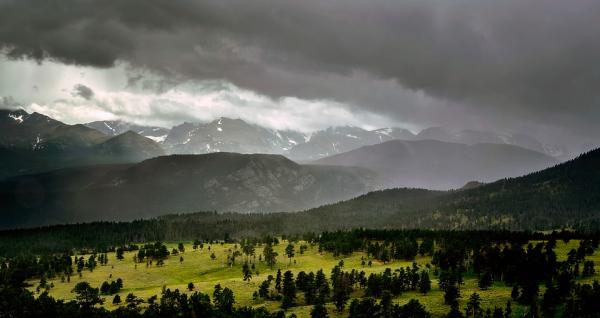
By Rebecca Aronauer
I didn’t read Richard Ford until I had been in Denver for a year, but in revisionist history, his collection Rock Springs is one of the reasons I came west. To me, Rock Springs is the definitive collection about Mountain Time Zone life—hardscrabble with a lingering humanity and bad weather.
My favorite story from the collection is “Optimists.” (It’s available in a slightly different form here.)
In the story, an older narrator looks back on, well, it’s best to let him explain:
All of this that I am about to tell happened when I was only fifteen years old, in 1959, the year my parents were divorced, the year when my father killed a man and went to prison for it, the year I left home and school, told a lie about my age to fool the Army, and then did not come back. The year, in other words, when life changed for all of us and forever—ended, really, in a way none of us could ever have imagined in our most brilliant dreams of life.
[caption id="attachment_8982" align="aligncenter" width="222"] Richard Ford[/caption]
Richard Ford[/caption]
Many parts of the story have stayed with me, particularly the narrator’s mom’s description of swimming in the winter as the “greatest luxury.” It happened that I swam a lot the winter after I read this story, and I thought about that line each time I watched darkness overtake the Denver skyline from the comfort of a heated pool. (Quick shout out to the Rude Rec Center—best pool in town.)
I’ve read this story maybe a half dozen times, even held a short story club on it before a Richard Ford reading. But it wasn’t until last winter that I really appreciated the point of the story, which to me is “that situations have possibilities in them, and we have only to be present to be involved.”
I had underlined this sentence the first time I read the story, but only because it’s beautiful. It wasn’t until I went to Jumpstreet, the trampoline park, for a date and left with a concussion, that I got its meaning.
At Jumpstreet, my boyfriend encouraged me to try a backflip. I landed straight on my head. As Richard Ford would say, all that happened next is what you would expect to happen: there was a lot of guilt, a purchase of Advil, a reassuring and expensive trip to the hospital, a sore neck, and a full recovery.
[caption id="attachment_8983" align="aligncenter" width="300"] Jumpstreet[/caption]
Jumpstreet[/caption]
The night of the head injury, my boyfriend and I read “Optimists” in bed. When we got to the line about situations with possibilities, I finally understood it. A visit to Jumpstreet has all sorts of possibilities—good, clean American strip mall fun, but also, all the reasons Jumpstreet has you sign a waiver. And just being present at your girlfriend’s failed attempt at a backflip makes you involved.
I got into fiction writing because I love fiction reading. And to me, the worst part of being a writer isn’t the loneliness, the early mornings, or the lost delusions of grandeur. It’s that reading isn’t as fun anymore. I’m always trying to figure out how a short story works, instead of allowing myself to be transported for twenty pages.
But occasionally, literature helps me connect to the world and people. And it can transform the night of a head injury into the night someone discovers Richard Ford.
This post is part of our annual Lit Counts series, in which writers and readers express why supporting and elevating literary arts—the mission of Lighthouse Writers Workshop—is important to them. If you agree, consider supporting Lighthouse on Colorado Gives Day. Mark your calendar for December 6 or schedule your gift now. Thank you!
Rebecca Aronauer is a short story writer and host of the speaker series Making the Mountain. Her work has been published on Twitter and the Columbia Review.

